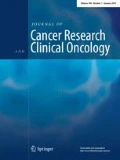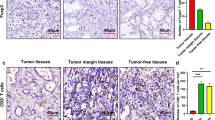Abstract.
Purpose: TNF-related apoptosis-inducing ligand (TRAIL) and its receptors have recently been known to be responsible for apoptotic signaling molecules in tumor cell lines and tissues. These molecules have been reported to be expressed on merely a transcription level, but not on a protein level. Moreover, little is known about TRAIL-mediated apoptosis in human carcinoma in vivo. Methods: We investigated the presence and functional status of TRAIL and its receptors, DR4, DR5, and DcR2 on tumor as well as tumor-infiltrating lymphocytes (TIL) in primary (n=37), and metastatic gastric carcinoma from malignant ascites (n=37) by a flow cytometry. In addition, phenotypic proportions of major T-cell subsets or B-cells in TIL were also determined. Results: Membrane-bound TRAIL/its receptors are constitutively expressed at high levels in primary and metastatic carcinomas in nearly all the patients. Apoptotic tumor cells detected by terminal deoxynucleotidyl transferase (TdT)-mediated dUTP nick and labeling (TUNEL) were barely identified in primary and metastatic carcinomas. TIL in primary carcinoma showed a very low level of expression of TRAIL/its receptors and TUNEL-positive cells. In metastatic carcinoma, however, there was significant overexpression of TRAIL/its receptors in TIL associated with a higher frequency of apoptotic cell death detected by TUNEL. The TIL within metastatic carcinoma, but not within primary carcinoma, revealed the increased proportions of CD3+ T cells bearing CD8+CD11b–, CD8+CD11b+, and CD4+CD62L–, CD4+CD62L+ surface phenotype in patients. Conclusions: These results suggest that TRAIL+ and DcR2+ metastatic carcinoma from malignant ascites could not only have resistance to DR4/DR5-induced apoptosis, but also might take the TRAIL-mediated counterattack against activated CD3+ T cells. These functions of the cancer cells would neutralize host immune responses at the effector phase, and accelerate further invasion and/or metastasis of carcinoma through the escape from immune attack.
Similar content being viewed by others
Author information
Authors and Affiliations
Additional information
Electronic Publication
Rights and permissions
About this article
Cite this article
Koyama, S., Koike, N. & Adachi, S. Expression of TNF-related apoptosis-inducing ligand (TRAIL) and its receptors in gastric carcinoma and tumor-infiltrating lymphocytes: a possible mechanism of immune evasion of the tumor. J Cancer Res Clin Oncol 128, 73–79 (2002). https://doi.org/10.1007/s004320100292
Received:
Accepted:
Issue Date:
DOI: https://doi.org/10.1007/s004320100292




